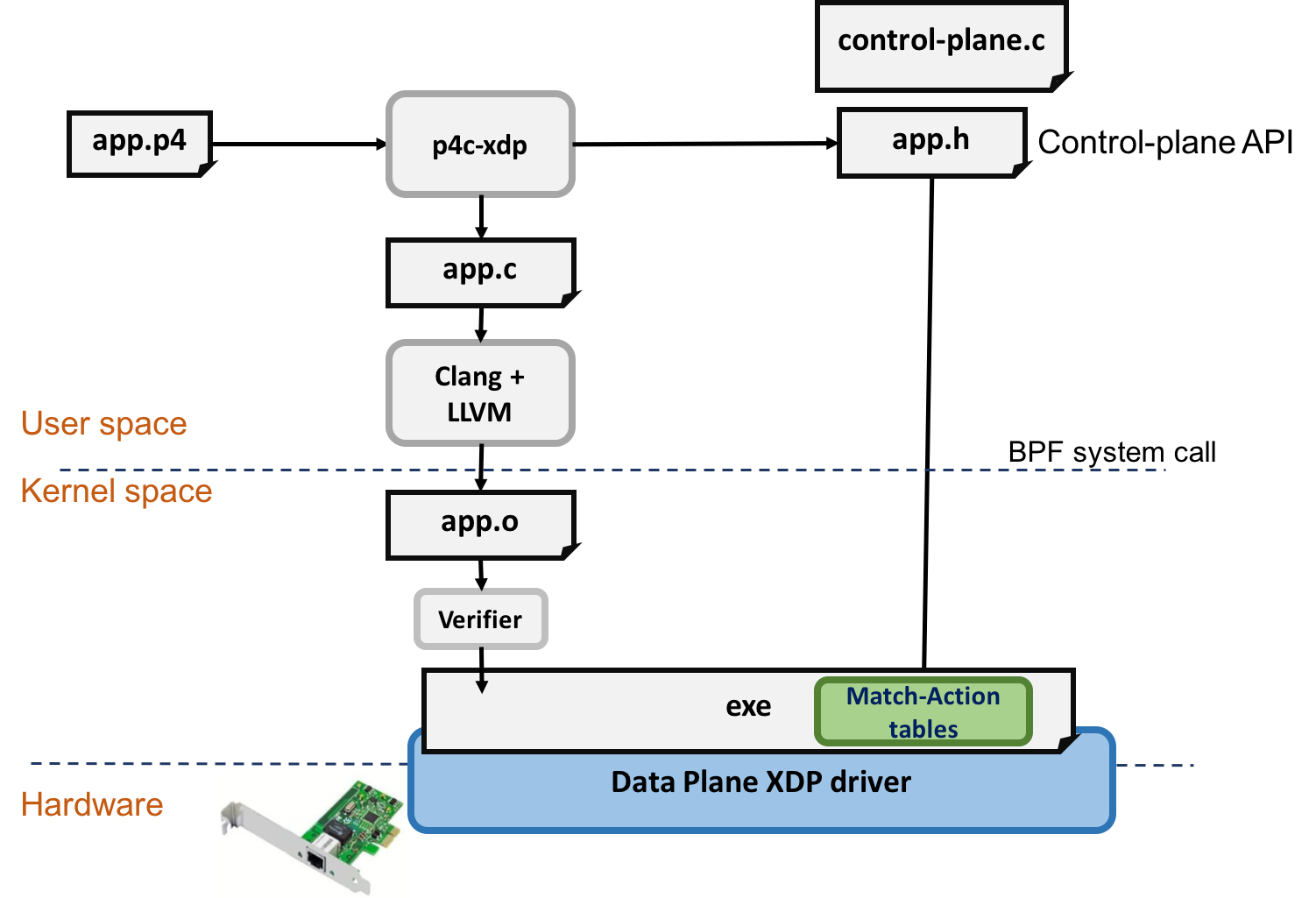p4c-xdp
This work presents a P4 compiler backend targeting XDP, the eXpress Data Path. P4 is a domain-specific language describing how packets are processed by the data plane of a programmable network elements, including network interface cards, appliances, and virtual switches. With P4, programmers focus on defining the protocol parsing, matching, and action executions, instead of the platform-specific language or implementation details.
XDP is designed for users who want programmability as well as performance. XDP allows users to write a C-like packet processing program and loads into the device driver's receiving queue. When the device observes an incoming packet, before hanging the packet to the Linux stack, the user-defined XDP program is triggered to execute against the packet payload, making the decision as early as possible.
We bring together the benefits of the two: P4 and XDP. To get started, first you need to setup the P4-16 compiler, then this project is an extension to the P4-16. To execute the XDP, you need Linux kernel version >= 4.10.0-rc7+ due to some BPF verifier limitations
Presentation
Installation
Docker/Vagrant
Please see Dockerfile. There is also a public docker image available as u9012063/p4xdp
$ docker pull u9012063/p4xdpwill pull the latest image. However, the XDP BPF code has dependency on your kernel version. Currently for some complicated cases we require kernel >= 4.10.0-rc7. So a vagrant box is also provided with kernel 4.10.0-rc8.
$ vagrant up
$ vagrant ssh
ubuntu@ubuntu-xenial:~$ sudo su
root@ubuntu-xenial:/home/ubuntu# docker images
REPOSITORY TAG IMAGE ID CREATED SIZE
u9012063/p4xdp latest 3c77fbbd84e5 41 hours ago 2.469 GB
root@ubuntu-xenial:/home/ubuntu# docker run -it -u root --privileged <IMAGE ID>Will boot this VM, pull the docker image, and you can try p4c-xdp.
P4-16 Compiler
First you need to follow the installation guide of P4-16 When you have P4-16 compiler, then add this project as an extension. Assuming you have P4-16 at your dir ~/p4c/, to setup P4C-XDP:
cd ~/p4c/
mkdir extensions
cd extensions
git clone https://github.com/vmware/p4c-xdp.gitNow that you have cloned p4c-xdp at ~/p4c/extensions/p4c-xdp, the next step is to recompile p4c:
cd ~/p4c/
mkdir -p build
cd build/
cmake ..
makeThis generates a p4c-xdp binary in ~/p4c/build. Next create a soft link to the binary:
cd ~/p4c/extensions/p4c-xdp
ln -s ~/p4c/build/p4c-xdp p4c-xdpNow you can run the p4c-xdp tests:
cd tests
make
This will check your llvm and clang version, compile all .p4 files, generate .c files, and load them into the kernel to be checked by the BPF verifier.
XDP: eXpress Data Path
XDP is a packet processing mechanism implemented within the device driver with eBPF. Currently to compile a P4 to C program, uses
# ./p4c-xdp --target xdp -o <output_c_file> <input_p4>
./p4c-xdp --target xdp -o /tmp/xdp1.c xdp1.p4 then you need to compile the xdp1.c to eBPF bytecode, xdp1.o, then loaded into your driver. To compile a single .c file
clang -Wno-unused-value -Wno-pointer-sign \
-Wno-compare-distinct-pointer-types \
-Wno-gnu-variable-sized-type-not-at-end \
-Wno-tautological-compare \
-O2 -emit-llvm -g -c /tmp/xdp1.c -o -| llc -march=bpf -filetype=obj -o /tmp/xdp1.oThen loaded into driver with XDP support
ip link set dev $DEV xdp obj xdp1.o verbto unload the XDP object
ip link set dev $DEV xdp offSample Code
Please see the tests folder Simply run 'make' will start the build
Related BPF/XDP work
- Dive into BPF: a list of reading material, Quentin Monnet link
- BPF: Next Generation of Programmable Datapath by Thomas Graf, OVS Conf 2016 video
- Fast Programmable Networks & Encapsulated Protocols, David S. Miller, netdev 1.2 video
License
The p4c-xdp/lib/* contains BPF loader licensed under the General Public License, Version 2.0. The rest of p4c-xdp components are licensed under the Apache License, Version 2.0.
TODO
- Remove the private kernel patch requirement when latest kernel with BPF fixed is ready
- Apply the workaround of BPF_MAX_STACK
- Control plane example using perf_event_output


